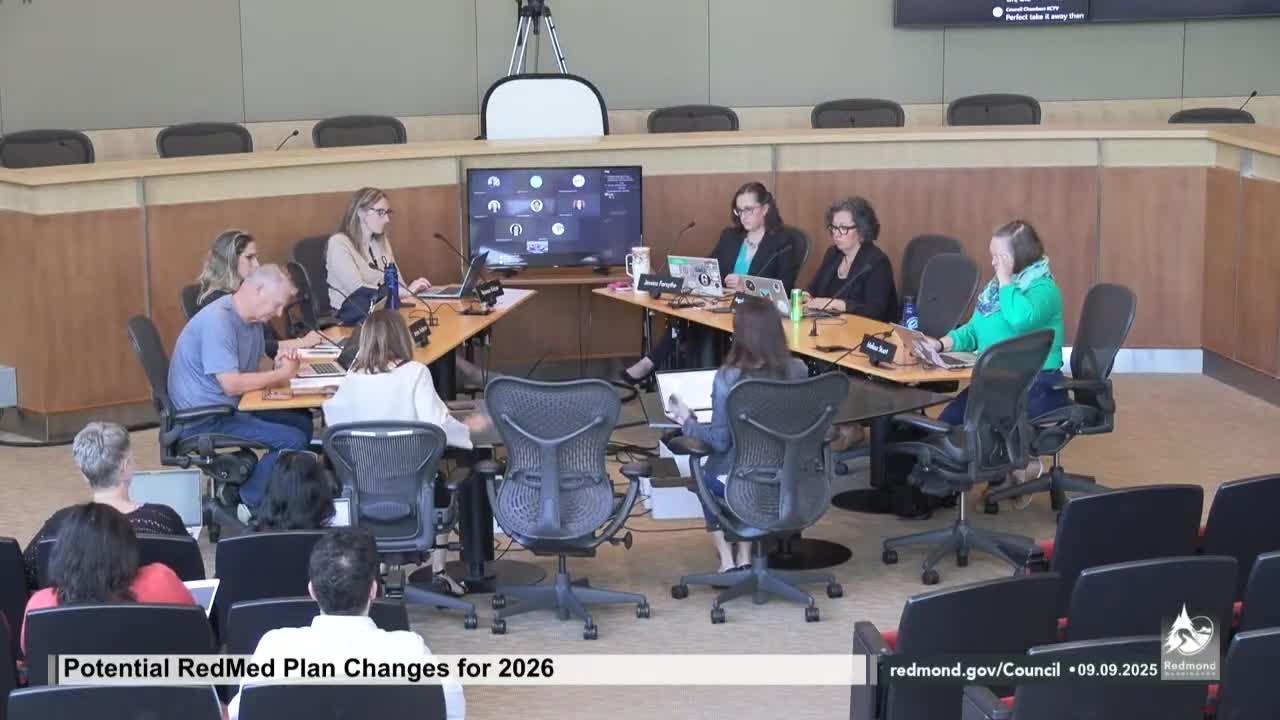RedMed plan to add two opt-in support programs and align benefits with state laws; council to consider on consent
Get AI-powered insights, summaries, and transcripts
Subscribe
Summary
Redmond HR presented three RedMed 2026 plan changes — two opt‑in support programs administered by Premera and state-law-aligned benefit adjustments — and asked the council to place them on the Sept. 16 consent agenda.
Catherine Laird, Redmond’s human resources director, and Nicole Bruce, program manager for benefits, told the Committee of the Whole on Sept. 9 that the city’s self‑insured health plan RedMed is proposing three plan design changes for 2026. The benefits advisory committee unanimously recommended the changes and HR is asking the council to place them on the Sept. 16 consent agenda as required by the city’s personnel manual.
The three proposed changes are: an opt‑in health support program (for complex chronic conditions) administered by Premera, an opt‑in cancer care support program, and two state-law alignment items — a $35 maximum copay for asthma inhalers and EpiPens, and waiving cost sharing and prior authorization for inpatient HIV treatment and post‑exposure drug therapies. Laird described the two support programs as additional tools Premera offers (phone/app-based counseling and care coordination); enrollment would be voluntary and fully covered by the health plan (no member premium).
Laird said the committee spent July and August reviewing recommended changes with the city’s broker and third-party administrator and unanimously voted to recommend the three items. She told council that, based on Premera’s book-of-business, the two support programs are new and do not yet have city-specific utilization statistics; the plan will monitor enrollment and outcomes. Laird and Bruce said the overall cost impact is expected to be minimal: outreach, care coordination and better medication adherence can offset program costs by reducing avoidable claims over time.
Council members sought clarifications. Council member Forsyth asked whether the cancer-care program supplements existing clinical outreach and whether enrollment could occur at any time; Bruce and Laird confirmed the option is an enhanced level of service above existing chronic-condition outreach, is opt‑in, and is free to members; employees can enroll anytime. Council member Stewart asked explicitly whether any upcoming RedMed changes are expected to affect comprehensive reproductive or gender‑affirming care; an HR representative replied “No.”
Council members asked about coverage for “experimental” treatments. Laird said there was no recommendation to add coverage for experimental treatments; she explained that adding such coverage interacts with the city’s stop‑loss insurance and would complicate underwriting and premium calculations. Council members requested that staff monitor program uptake and outcomes and report back as part of regular benefits and budget oversight.
Laird said the city will present the three changes on the Sept. 16 consent agenda; the committee did not record a formal vote in committee but advanced the recommendation for consent placement by general assent.
